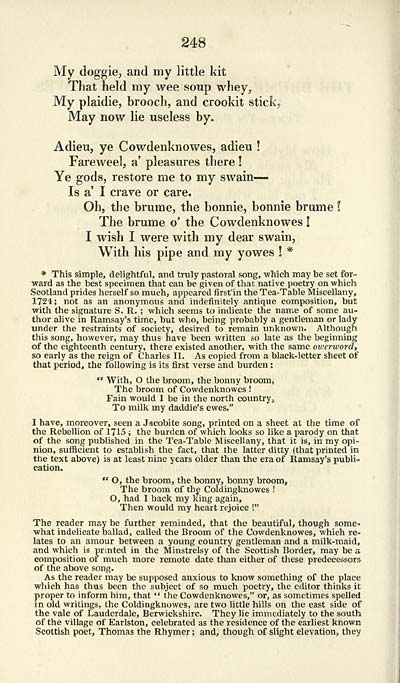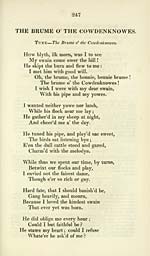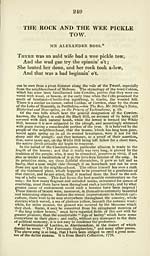Glen Collection of printed music > Printed text > Scottish songs > Volume 1
(350) Page 248
Download files
Complete book:
Individual page:
Thumbnail gallery: Grid view | List view

248
My doggie, and my little kit
That held my wee soup whey.
My plaidie, brooch, and crookit stick.
May now lie useless by.
Adieu, ye Cowdenknowes, adieu !
Fareweel, a' pleasures there !
Ye gods, restore me to my swain —
Is a' I crave or care.
Oh, the brume, the bonnie, bonnie brume !
The brume o' the Cowdenknowes !
I wish I were with my dear swain.
With his pipe and my yowes ! *
* This simple, delightful, and truly pastoral song, which may be set for-
ward as the best specimen that can be given of that native poetry on which
Scotland prides herself so much, appeared first'in the Tea-Table Miscellany,
1724; not as an anonymous and indefinitely antique composition, but
with the signature S. R. ; which seems to indicate the name of some au-
thor alive in Ramsay's time, but who, being probably a gentleman or lady
under the restraints of society, desired to remain unknown. Although
this song, however, may thus have been written so late as the beginning
of the eighteenth century, there existed another, with the same owerword,
so early as the reign of Charles 11. As copied from a black-letter sheet of
that period, the following is its first verse and burden :
" With, O the broom, the bonny broomj
The broom of Cowdenknowes !
Fain would I be in the north country.
To milk my daddie's ewes."
I have, moreover, seen a Jacobite song, printed on a sheet at the time of
the Rebellion of 1715 ; the burden of which looks so like a parody on that
of the song published in the Tea-Table Miscellany, that it is, in my opi-
nion, sufficient to establish the fact, that the latter ditty (that printed in
the text above) is at least nine years older than the era of Ramsay's publi-
cation.
" O, the broom, the bonny, bonny broom.
The broom of the Coldingknowes !
O, had I back my king again.
Then would my heart rejoice !"
The reader may be further reminded, that the beautiful, though some-
what indelicate ballad, called the Broom of the Cowdenknowes, which re-
lates to an amour between a young country gentleman and a milk-maid,
and which is prmted in the Minstrelsy of the Scottish Border, may be a
composition of much more remote date than either of these predecessors
of the above song.
As the reader may be supposed anxious to know something of the place
which has thus been the subject of so much poetry, the editor thinks it
proper to inform him, that " the Cowdenknowes," or, as sometimes spelled
in old writings, the Coldingknowes, are two little hills on the east side of
the vale of Lauderdale, Berwickshire. They lie immediately to the south
of the village of Earlston, celebrated as the residence of the earliest known
Scottish poet, Thomas the Rhymer ; and, though of slight elevation, they
My doggie, and my little kit
That held my wee soup whey.
My plaidie, brooch, and crookit stick.
May now lie useless by.
Adieu, ye Cowdenknowes, adieu !
Fareweel, a' pleasures there !
Ye gods, restore me to my swain —
Is a' I crave or care.
Oh, the brume, the bonnie, bonnie brume !
The brume o' the Cowdenknowes !
I wish I were with my dear swain.
With his pipe and my yowes ! *
* This simple, delightful, and truly pastoral song, which may be set for-
ward as the best specimen that can be given of that native poetry on which
Scotland prides herself so much, appeared first'in the Tea-Table Miscellany,
1724; not as an anonymous and indefinitely antique composition, but
with the signature S. R. ; which seems to indicate the name of some au-
thor alive in Ramsay's time, but who, being probably a gentleman or lady
under the restraints of society, desired to remain unknown. Although
this song, however, may thus have been written so late as the beginning
of the eighteenth century, there existed another, with the same owerword,
so early as the reign of Charles 11. As copied from a black-letter sheet of
that period, the following is its first verse and burden :
" With, O the broom, the bonny broomj
The broom of Cowdenknowes !
Fain would I be in the north country.
To milk my daddie's ewes."
I have, moreover, seen a Jacobite song, printed on a sheet at the time of
the Rebellion of 1715 ; the burden of which looks so like a parody on that
of the song published in the Tea-Table Miscellany, that it is, in my opi-
nion, sufficient to establish the fact, that the latter ditty (that printed in
the text above) is at least nine years older than the era of Ramsay's publi-
cation.
" O, the broom, the bonny, bonny broom.
The broom of the Coldingknowes !
O, had I back my king again.
Then would my heart rejoice !"
The reader may be further reminded, that the beautiful, though some-
what indelicate ballad, called the Broom of the Cowdenknowes, which re-
lates to an amour between a young country gentleman and a milk-maid,
and which is prmted in the Minstrelsy of the Scottish Border, may be a
composition of much more remote date than either of these predecessors
of the above song.
As the reader may be supposed anxious to know something of the place
which has thus been the subject of so much poetry, the editor thinks it
proper to inform him, that " the Cowdenknowes," or, as sometimes spelled
in old writings, the Coldingknowes, are two little hills on the east side of
the vale of Lauderdale, Berwickshire. They lie immediately to the south
of the village of Earlston, celebrated as the residence of the earliest known
Scottish poet, Thomas the Rhymer ; and, though of slight elevation, they
Set display mode to: Large image | Transcription
Images and transcriptions on this page, including medium image downloads, may be used under the Creative Commons Attribution 4.0 International Licence unless otherwise stated. ![]()
| Special collections of printed music > Glen Collection of printed music > Printed text > Scottish songs > Volume 1 > (350) Page 248 |
|---|
| Permanent URL | https://digital.nls.uk/90293092 |
|---|
| Shelfmark | Glen.105 |
|---|---|
| Additional NLS resources: | |
| Attribution and copyright: |
|
| Description | Scottish songs and music of the 18th and early 19th centuries, including music for the Highland bagpipe. These are selected items from the collection of John Glen (1833 to 1904). Also includes a few manuscripts, some treatises, and other books on the subject. |
|---|
| Description | The Glen Collection and the Inglis Collection represent mainly 18th and 19th century Scottish music, including Scottish songs. The collections of Berlioz and Verdi collected by bibliographer Cecil Hopkinson contain contemporary and later editions of the works of the two composers Berlioz and Verdi. |
|---|

